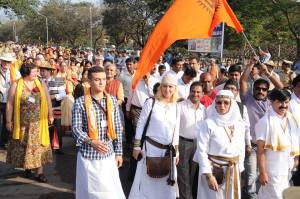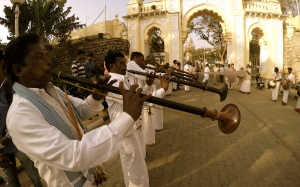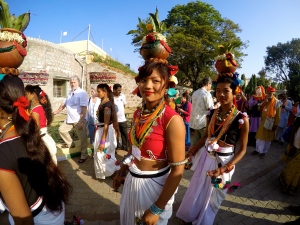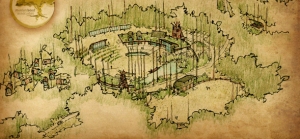“One day, I’ll travel the world.” “One day I’ll SAVE the world.” “One day, I’ll start my own business.” “One day I’ll quit this job I hate and actually do something I enjoy.” “One day, one day, one day…”
I regret to inform you but if your aspirations sound like this, that “one day” will never come. This type of sentence structure subconsciously puts you into fairy-tale-mode with no real hope of actually achieving anything, only dreaming about it.
It is beautiful and necessary to dream, but if you don’t associate that dream with a measurable time frame and a plan of action, chances are, it will never happen.
This is why I have applied specific and measurable goals to my dream of building a Green City. Although these are small initial steps, these humble beginnings are necessary to create the foundation for achieving any objective. After all, you cannot go from Kindergarten to University in one year. Even if you managed to get in, you would do a very sloppy job.
For my Green City dream, I am currently expanding my frame of reference by traveling to sparsely & densely populated areas, meeting diverse people with similar interests, and working on projects dealing with Ecovillage design, natural building and urban planning – to name a few.
Upon arriving to Mysore, India in February, I contemplated how there aren’t many better ways to expand my frame of reference than by attending a conference on ancient cultures and traditions. I was going to The Gathering of Elders (sounds like something out of Lord of the Rings), which takes place every 3 years in a different location within the Indian sub-continent. This year’s central theme is: preservation of ancient wisdom amidst the increasing pressures of globalization.
Representatives from about 60 different countries, and countless other sub-cultures, convened to continue the discussion of ancient wisdom’s role in contemporary society.




Thanks to the chief coordinator of the event (and my advisor), Dr. Yashwant Pathak, I was able to attend and come into contact with diverse array of people. Up until this conference, it had not dawned on me the sheer diversity in human belief systems and traditions. Yet, despite this variety, I could not help but notice their underlying similarities. People from opposite sides of the globe came together to share their millennia-old ancestral wisdom, but no matter how divergent they seem, they are all essentially different paths leading to the same light.
Much of this has to do with the fact that all of the ancient lifestyles originated in human settlements – pre-civilization, i.e. before urban life. Prior to the advent of the first cities in Mesopotamia 5000 years ago, humans lived in village-sized settlements that were deeply intertwined with nature. Thus, the human ecosystem was simply a natural expression of the relationship between the people and the land. In these dwellings, humans had such a deep understanding of their dependency on the natural world for survival, that it would have been ludicrous to unsustainably exploit its resources. Hence, the founders of ancient traditions lived in small, walkable communities that were self-regulating and self-grown.

I became more cognizant of the invaluable role that ancient wisdom plays in the formation of sustainable eco-communities that have the ability to endure into the indefinite future. Attending this conference and doing some additional research has caused me to see the infrastructure and layout of the Green City in a new light.
It made me realize that every one of us is standing on the shoulders of giants, but most of us are oblivious of our advantageous position.
Not only must we safeguard what our ancestors have been preserving for millennia, we must also actively create our own culture. Culture is not something passive that we simply inherit from our forefathers. It is a dynamic, proactive exercise that we create on a daily basis through our thoughts, actions and interactions.
It is our responsibility to craft our own cultures and lifestyles for, if not, some far-away monoculture machine will surely take up the task. This machine is a product of its system and, by the way – its mission is not to nurture the sustainable well being of life – it is to generate profit.
So if we don’t take charge of the situation, then we basically throw ourselves into the mouth of the beast that will devour all social, ecological and cultural resources in the name of exponential growth (not to be confused with development).

Does this sound familiar to you?
When you spend 2 hours a day sitting in a car, zooming by strip malls and large square grids of tasteless suburban homes, doesn’t it seem strange that it’s the pedestrians on the sidewalk that look out-of-place, and not the rest of us – in our air-conditioned boxes on wheels?
This urban sprawl is merely one example of the negative side-effects of competitive globalization that the conference elders were concerned about. The key, however, is to leverage globalization’s positive attributes such as modern science, technology & communication systems in order to achieve sustainable development that is not only progressing, but also retaining the organic structure inherent to the fabric of life.

Some people think globalization is bad. Some people think globalization is good. The truth is, most things in life are not inherently good or bad but rather, dependent on your perspective.
Elders of ancient traditions can try to evade globalization by retreating into remote corners of the world until their numbers dwindle down to zero, or they can adapt and become revitalized by a revolutionized communication system.
I can view globalization as a severe impediment to my Green City Dream, or I can view it as the catalyst that will propel us into the new Era of Sustainability.
You can view your current life situation as a tedious series of hardships, or you can view your obstacles as invaluable stepping-stones to realizing your full potential.
Ultimately:
Your attitude + your focus of energy + your decisions = Your Reality
Life is not something that happens to you, life is an ongoing process of creative self-expression. Do not practice self-pity because you “find” yourself in a particular situation. You have not just “found” yourself in this situation – you have arrived here because of all of your past thoughts and actions, and nothing is going to change if you do not alter these two things.
The most magnanimous accounts of human history were not created by people who shed responsibility and blamed others, but by those who took charge of their personal situation and worked for the common good.
This is as true for the guardians of ancient knowledge as it is for you. So happily depart “victim zone” and trade in your regret for acceptance. Accept that you are 100% responsible for everything in your life up to the present moment. And now = do something about it. It is the first day of the rest of your life and you are free to do with it what you please. Get started immediately – because no one else is going to start for you.


Reblogged this on Small Town Soul, Big City Brain and commented:
Circulating Inspiration
I keep coming across people traveling parallel paths, as I mentioned in my last blog post. The Urban Villager is one example. Others I follow include: Green, Eggs and Cans; Greener Me; The Greening of Gavin; and The Ecotone Exchange; The Self Sufficient HomeAcre; and others I will eventually reblog or mention in a post. I gave up Facebook to seek more trustworthy sources of information, and I ended up finding it as well as inspiration. As The Urban Villager demonstrates, the green movement spans the globe, and people around the world are transforming their corners of the planet. I’m pleased to play my part.
LikeLiked by 1 person
Thanks April for mentioning others traveling on parallel paths and spreading the love and knowledge 🙂
LikeLiked by 1 person
Reblogged this on The Treasure Trove and commented:
“Ultimately:
Your attitude + your focus of energy + your decisions = Your Reality
Life is not something that happens to you, life is an ongoing process of creative self-expression.”
LikeLike